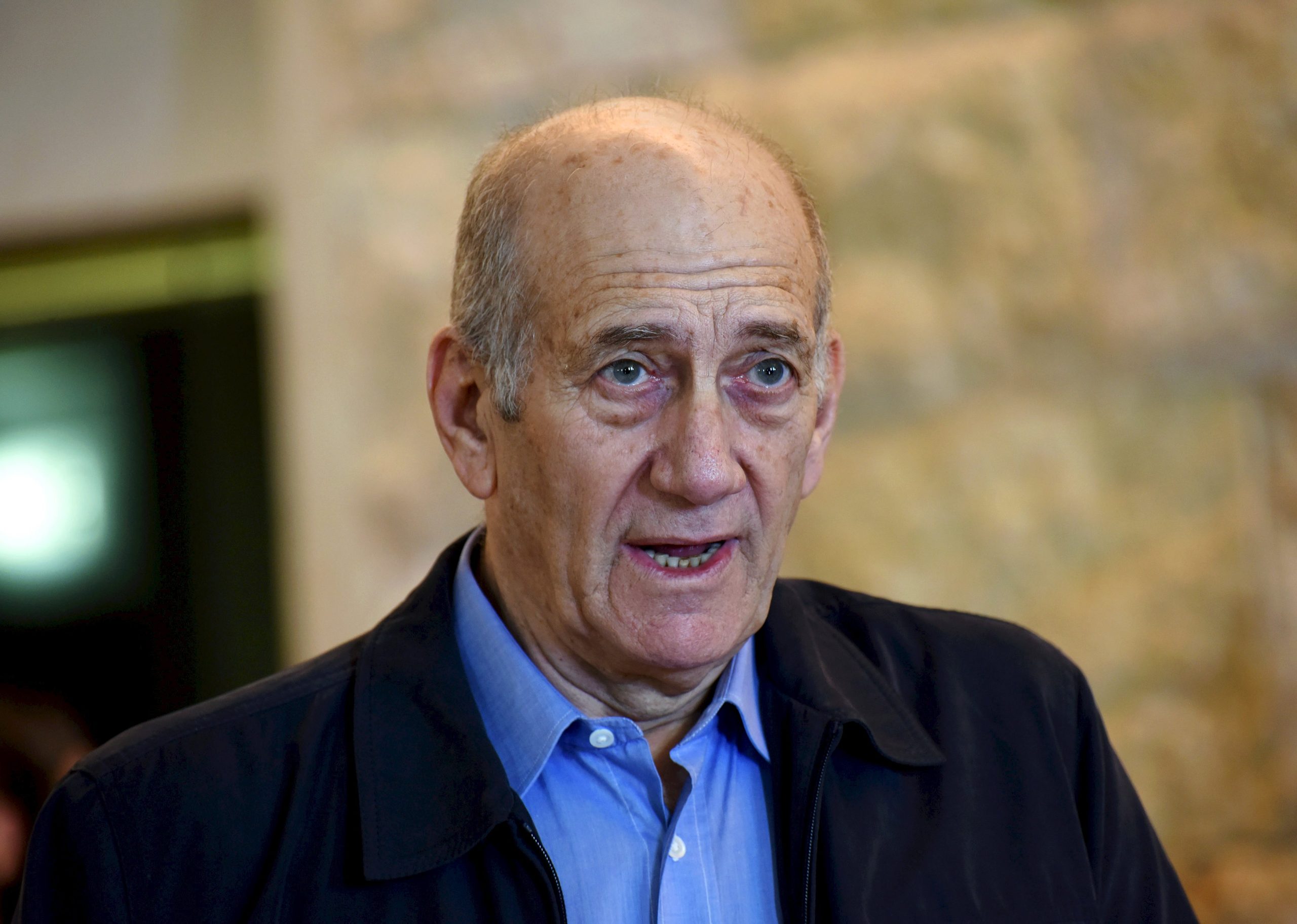In this interview, former Israeli Prime Minister Ehud Olmert shares his thoughts on the future of the two-state solution to the Israeli-Palestinian conflict, the rise of right-wing movements globally, and the changing political landscape in Israel and the world.
You have talked with the Palestinians for many years, and you have talked about separate Israeli and Palestinian states. What I want to ask now is this: what do you believe? Is the two-state solution just a dream? Or is it still feasible?
First of all, I want to tell you something about dreams, okay? You asked me if this is a dream. Well, George Bernard Shaw originally said it, and John F. Kennedy and Robert F. Kennedy later quoted him: “Most people see things as they are and ask why. I dream things that never were and ask why not.” So even if this is a dream, why not?
It is the only comprehensive political solution possible for a historic conflict that seems to shake and destabilize a very important part of the world, the Middle East, and perhaps even beyond it. So, we have to make every possible effort to implement it. And I don’t think it’s a dream. Many ideas and plans have been promoted and elaborated over the years: Autonomy for the Palestinians in the territories; Deportations of the sort President Trump recently proposed, removing two million people from Gaza; The expulsion of Palestinians from the West Bank, as Ben-Gvir and his associates are trying to achieve in practice. All these are plans, but they are not solutions. Because a solution will have to change the course of history. And—hopefully, over a long period of time, not overnight—change the basic patterns of relations in the Middle East, helping new peaceful relations to come into being with mutual respect between Jews and Arabs, Jews and Muslims, Israelis and Palestinians. The two-state solution can do that; nothing else can.
Do you believe there are people in Israel and in Palestine today who believe in that dream and can make it a reality? Or do they believe in President Trump’s talk of a Gaza Riviera?
Look, rest assured there will be no Trump Tower Hotel in Gaza, okay? Trump may have proposed it, but it will never happen. Of course, there are some people who would have wanted that. Not Palestinians, I think, but some of the Messianic groups in Israel did get extremely excited when Trump said Gaza would become a ‘riviera’. Still, they weren’t excited because they want Gaza to be a Riviera. No, they want Gaza to be one big settlement: an Israeli settlement.
And while there are Israelis who would welcome a development like that, there currently aren’t enough Israelis who support the two-state solution. Still, there is a solid basis of support for it, and we have to fight. Had everyone supported it, no one would have noticed me talking about it. The one good reason to talk about it is that there are not yet enough supporters of a two-state solution. But since this is the only inevitable solution, an historic solution, an historic change, you have to campaign for it, you have to go forth into the world and talk about it, so the realities will change. And I believe those realities will change. It’s just a matter of time. And hopefully, when the Israeli government is overthrown and Netanyahu is cast aside onto the sidelines of history where he belongs, then it will become more realistic.
Many have equated the Palestinians with terrorism, because of Hamas especially. Do you believe the Palestinians are under the strict control of Hamas? Do they want a different leadership?
Look, there are terrorists amongst the Palestinians. That’s obvious. Hamas is a terrorist organization. And it is a Palestinian organization, so there are Palestinian terrorists. There is Islamic Jihad. But to equate Palestinians with terror, and say all Palestinians are terrorists, is obnoxious. It an outrageous, intolerable and unacceptable thing to do. There are terrorists among the Palestinians. And there are terrorists in Israel, no? But 95% or 99% of the Palestinians are not terrorists, okay. They are human beings. They want to live in peace. They want to have the same quality of life that others have. They want to live without occupation, by the way, which is not something that can be ignored or overlooked. And they are also terrorists among the Palestinians. And it’s true that the weight of the radical movements in the Islamic countries is greater than they it is in European countries, say, which have a long tradition of democracy. We have Iran, Afghanistan, Pakistan—all these countries which are heavily Islamic, which are not democratic, and which are dominated by extreme fundamentalist and radical movements. It’s true.
But in Iran, as in Palestine, there are revolutionary guards, there are government services which are heavily dominated by the Islamic ayatollahs, radical movements. But the overwhelming majority of the people in both countries want to live a good life, perhaps a more modern life without the strict rules of the ayatollahs. And, you know, we have to relate to this. We have to fight these radical movements. We have to oppose them with all our power, with all our determination. But we must not lose our sense of proportion. Okay? Most of the Palestinians, the overwhelming majority, are in favor of living peacefully with us. And the same is true of and in other countries.
Do you think the European Union—and the UK, especially now they have come together to help Ukraine—can play a crucial role in the Middle East, alongside the United States?
I hope the Europeans will play a greater role in shaping the future of the Middle East, and I am personally campaigning and appealing to them. I’ve travelled to almost every part of Europe. I’m going to be in Greece next week and hope to meet some of your leaders. I’ve been in France and Great Britain, Spain and Italy, Norway, Sweden and Finland, Austria, Denmark and Holland. Everywhere I can reach out to European leaders. And I’ve been to Belgium, met with Belgian leaders and others, and tried to move them to share with me the desire to impose a new agenda on the international narrative about a possible solution to the historic conflict between Israel and the Palestinians.
And I’m hopeful. I’ve been quite impressed by the response I’ve received, together with my partner, the Palestinian leader Dr. Nasser al-Qudwa, who was the foreign minister and UN ambassador of the Palestinian Authority. Together, we are now going everywhere we can to promote the idea of a two-state solution.
Are you worried that we’re heading toward a world where traditional rules no longer apply? And what about the rise of far-right parties in Europe?
I’m certainly aware of changes that are threatening the old order in Europe and North America. Trump is shaking it one way, and the right-wing movements in Germany, France, Italy and other countries certainly threaten to exchange the stability of the old system for something entirely different. And we certainly can’t overlook what Trump is doing in America. I hope, I believe that the powers that be will be firm enough, strong enough, stable enough and determined enough to defend the basic principles of democracy, of moral integrity which have characterized lives in our parts of the world for the last 80 years. This is a challenge which we have to face. I don’t have an absolute answer, because I think it’s too early. But this is something that we should be aware of and do everything in our power to stop.
We recently saw that Marine Le Pen banned from running for office in France. Yet in the U.S., Trump can run for president even though convicted. How do you view this conflict between justice and politics, especially in relation to Netanyahu?
I heard about Ms. Le Pen and the court decision. I’ve stayed up to date with events in America, too, and the fact that President Trump was indicted and even convicted of a felony a year ago. And I know the American Constitution didn’t stop him from running, and from being elected with a very clear majority. But I don’t know enough about the French Constitution to offer an opinion or an observation on the decision regarding Mr. Le Pen. I can only say this: I hope the Israeli court process will forbid Netanyahu from remaining in his position as prime minister. And I hope that, in any event, he will be dealt the heavy defeat he deserves in the next elections.
Finally, regarding the devastating terrorist attack on October 7th: has it changed Israel and how its people proceed from here?
I think that the events of the 7th of October were devastating. They were shocking. The most traumatic shock the Jewish people have had since the Holocaust. There has never been anything to compare with it. The Jews were massacred, helpless, without defense, in our own state. And this is not because we don’t have an army: as we have seen since, we have the most powerful army in the Middle East. We have very sophisticated technology that can reach everywhere, into any shelter or tunnel, window or bunker, any place in the Middle East and beyond. But there was an arrogance, an overconfidence and a disregard of sorts for Hamas’ threats. The feeling was “Who are they, these Palestinians, that they can threaten Israel, the start-up nation, the powerful nation,” and so on and so forth. So I think that what we suffered was, of course, totally unforgivable and unacceptable and intolerable. And that it has definitely devastated many Israelis and their attitude towards and tolerance for the Palestinians. Buy we have to get back to a normal place. We have to make sure we can defend ourselves at all times against all the enemies we have—and we have quite a few, including terrorist organizations. But at the same time, we have to turn back towards the only possible way an historical truce and peace can be achieved between us and the Palestinians. Without forgetting anything they did, without forgiving any one of those who committed these terrible crimes. But, at the same time, appealing to the conscience and the sense of proportion of the majority of the Palestinians who want to find the proper way to make peace between us and them.
Ehud Olmert will attend and participate in the 10th Delphi Economic Forum. The forum will take place in the city of Delphi on April 9-12, 2025.



